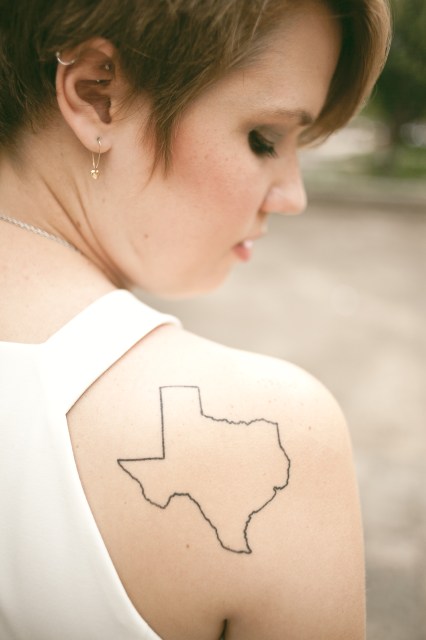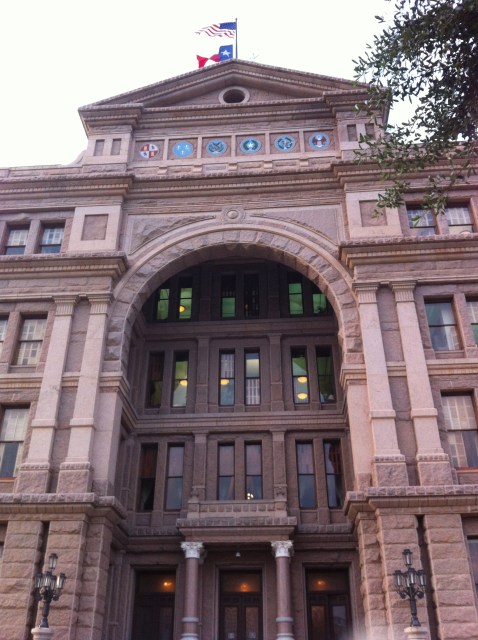Texas gives me whiplash.
I could never say it is hard to love my state. Loving Texas is an immutable constant etched into the core of my being — and into my right shoulder, where I wear its shape as a tattoo that matches that of a dozen friends and countless strangers. Texas raised me, and it taught me to fight, to think, to dream and to always be my authentic self. It gives me breakfast tacos, Beyoncé and limitless skies. But it gives me heartache, too. Its leaders’ rigidly conservative politics fly in the face of the values I learned there, like neighborliness, the power of individuals to help their communities, respect for difference and love for every fellow Texans.

I am one of those Texans, and I am not ashamed. Photo by Mari Kang of Prima Luce Studio
The state is easy to caricature with its loudmouth politicians, its big oil and big hair, its howdys and y’alls and fixins. Our retrograde textbooks and threats of secession make national news. Our politicians’ oopses, literal and not, provide endless Twitter fodder. Texas is geographically and culturally massive, so its gaffes and public policy failures are all the more noticeable and impactful. But its size also means that it has a lot of inertia, so when things move they move big. For example, 2003’s Lawrence v. Texas invalidated the criminalization of sodomy around the country.
Texas is moving now. Progressive and conservative Texans alike can feel that we’re on the brink of something major. So it was unsurprising last weekend when the Texas Republican Party endorsed a platform that explicitly rejects any efforts to make the state more inclusive to homosexual people and couples and endorses reparative therapy. From a draft of the platform obtained by the San Antonio Express News:
“Homosexuality must not be presented as an acceptable alternative lifestyle, in public policy, nor should family be redefined to include homosexual couples. We believe there should be no granting of special legal entitlements or creation of special status for homosexual behavior, regardless of state of origin. Additionally, we oppose any criminal or civil penalties against those who oppose homosexuality out of faith, conviction, or belief in traditional values. We recognize the legitimacy and value of counseling which offers reparative therapy and treatment to patients who are seeking escape from the homosexual lifestyle. No laws or executive orders shall be imposed to limit or restrict access to this type of therapy.”
They put that in their platform despite repeated statements from numerous major medical, health and psychiatric organizations rejecting reparative therapy and acknowledging that efforts to pathologize and repair homosexuality are ineffective. It is in these moments that many of my friends from other states tell me it’s time to give up on Texas, to accept its rejection of me and reject it in return. But what the major national news outlets and snarky east coast bloggers don’t often mention is that Texas is in a state of flux. Rivers of blue are coursing through the sea of red, and concrete changes are happening to disrupt the supposedly iron grip of conservatism.
Many of Texas’s major cities are rejecting the hardline GOP stance. At the end of May, Houston passed HERO, the Houston Equal Rights Ordinance, a comprehensive non-discrimination ordinance that advances the rights of LGB and trans people in housing, public accommodations, employment and more. The ordinance also includes race, military service, disability, sex, pregnancy and other groups in its protections. Houston Mayor Annise Parker, the first openly gay mayor of a major American city, called it her “most personally satisfying” act as mayor. The cities of Austin, Fort Worth, El Paso, San Antonio, Waco, Brownsville and Walker and Dallas Counties also prohibit employment discrimination on the basis of sexuality and gender. Public support for marriage equality is increasing steadily — a recent poll from Texas Tech University found that 48% support it and 47% oppose it. And in 2012 the Texas Democratic Party became the first southern Democratic Party to include same-sex marriage in its platform. The state’s marriage ban is currently going through the U.S. Court of Appeals after a U.S. District Judge Orlando Garcia ruled it unconstitutional in February.
So I understand why the GOP is scared. They’ve gotten pretty comfortable holding every statewide office and a majority in both houses of the legislature for the last couple decades. They’re digging their heels into the sand as the tide turns. But hateful platform language and fist shaking will not stop the ocean. Texas is too big to smother with such small ideas. My queerness doesn’t need repairing, but the GOP does.
Texans are the ones changing Texas. The state doesn’t get much financial or political support from national organizations, but statewide and local groups are working hard to educate our neighbors, friends, family members and all fellow Texans about what it means to be queer and Texan, what our rights are (and aren’t) and why change matters. For example, Equality Texas conducts statewide education and advocacy campaigns to lobby for laws at the capitol and educate Texans about the laws that affect their LGBT neighbors. Many people change their feelings once they learn about the types of discrimination LGBT Texans face, said development manager Lauren Zurbrügg.
“A lot of people don’t realize that it is still legal for LGBT people to be fired from their jobs solely on the basis of their sexual orientation or gender identity and expression.” Zurbrügg said. “It’s less sexy [than marriage], but that issue really appeals to people’s sense of Texaness.”
Texas’s vastness — it is 790 miles across and has 254 counties — makes it difficult for grassroots organizations to reach all Texans with their messages. The Transgender Education Network of Texas works to reach rural areas as well as big cities with information about transgender experience, rights, language and more.
“It’s very challenging to get to places like Midland Odessa and reach their PFLAG people. We don’t have the money to fly or drive to Midland for a one hour transgender awareness meeting,” said TENT board member Oliver Blumer. “But that’s the kind of place we would really love to be. “
They work to maximize resources by holding as many meetups and programs as possible in each place they visit. They especially work with churches, medical organizations and LGBT advocacy groups to increase understanding of transgender people and their needs. But it can be hard in a state that lacks uniform policies on things like how to get legal name and gender marker changes, so the process can take one day or many weeks depending on the judge who hears the case.
The inclusivity of Houston’s new ordinance only came after a long fight, said TENT director Katrina Stewart, but the final result was an ordinance that protects trans peoples’ right to public accommodations, employment and housing. Another recent victory for trans Texans is the February ruling in favor of Nikki Araguz, a Houston trans woman who was denied her husband’s death benefits when he died while working as a firefighter. Pending further legal steps, she will now be awarded the benefits, and it is the first time a Texas judge has ruled that Texas law recognizes the marriages of some transgender people. But, it also reveals failures in Texas’s laws regarding gender identity and gender marker change, Stewart said, because the ruling only applies to people who have had sex change surgery.
“The reality is that many in our community can’t afford that or that’s not the path they want to go. So it’s a mixed bag,” Stewart said. “We are very happy for Nikki to get this ruling, and this does send a message and move the dialogue forward.”
In cities like Austin, radical queer collectives are gaining traction, said Morgan Collado, a trans Latina writer and activist. She praised black queer arts collective House of Shakur and Clap BACC (Building Accountable Creative Community) for doing work around multiple intersections to promote radical justice.
“I have been called, on numerous occasions, Austin’s Number 1 queer enemy for daring to critique their transmisogyny and their racism. White queers are often my biggest challenge,” she said. “The way I respond to that is by building QPOC community.”
Individual work, like her work as a poet, makes an impact too. She just published her first book of poems, Make Love to Rage, and noted “So often we are erased or ignored when white folks write the history books and so writing for ourselves leaves a record that we were here. That we existed.”
I don’t want to underplay the intensity of Texas conservatism. Since new clinic funding and facility restrictions implemented in 2011 and 2013, nearly half of Texas abortion clinics have closed, leaving no clinics in rural areas. The state has repeatedly come under scrutiny for attempting to implement voter redistricting policies that violate the Voting Rights Act by essentially destroying the voting power of minority groups in many parts of the state. Republican lawmakers run and win on promises to make English the state’s official language, to strip social programs of funding, and to defend the state against anything President Barack Obama thinks is a good idea.

The Texas Capitol
Public opinion is shifting on many issues Texas, and the changing demographics of Texas has a part in this shift. Texas’s rapidly growing Latino population has energized the Democratic party. According to the Pew Research Center, 70 percent of Hispanic registered voters identified as Democrats or leaned toward the Democratic party in a 2012 poll.
“The fact that the Latino population is growing by leaps and bounds is a good indicator Texas is going to become a Democratic state,” said Lisa Paul, a spokeswoman for the party. “Our ticket looks like Texas. There are two women at the top of the ticket, and one is Latina. We’ve got an African American on our ticket. You want to vote for people who look like you and think like you, and that’s what this ticket is. People are unhappy, and new leadership will change that.”
Wendy Davis, the state senator who made waves last summer with her marathon filibuster against HB2, one of the aforementioned restrictive abortion bills, leads the ticket as this fall’s gubernatorial candidate. No polling data has demonstrated that she has a chance of winning against Republican Greg Abbott, but she has lit a fire under progressive asses across the state and country and created a sense of hope and possibility for change. It will take energy and funding on individual, local, state and national levels to help my state live up to its potential as a free, loving place for all people, including queers.
Ash Hall, a genderqueer lesbian organizer who works as the field director for State Representative Celia Israel, said she feels a sense of optimism and realism about the coming elections. Hall participated in the HB2 rallies and said that even though the bill passed, the experience and its “electric energy” made her feel better about Texas than she ever has before.
“I don’t know if Texas will turn blue this November, but I think we’ll see less red,” Hall said. “I’m not sure if Wendy Davis will be our next governor, but I think she can definitely run a close race and she’s already brought in lots of money and resources to Texas Democrats. I think things will be different this time around.”
Texas’s size and cultural and political visibility mean it has national influence, whether we like it or not. As Andrea Grimes noted in an essay during the HB2 filibuster:
Texas is not a throw-away state full of throw-away people who can be shrugged off with a contemptuous, “Well, what do you expect?” Texas is not an outlier. Texas is a test case for right-wingers with their eyes on the coasts and, as Congress showed this week, Washington, D.C.
As tides continue to shift, Texas has the potential to be a beacon for something better — for justice, equality, liberty and love, the values I developed growing up there. Don’t give up on Texas, queers. I promise Texas hasn’t given up on you.

Texas is big enough for all of us. Its policies must be as well.

Yes, you have explained Texas so well, and you are making me homesick! (in a good way) Definitely hopefully about the state changing in it’s politics– can’t happen soon enough!
Also, your tattoo looks amazing and is reminding me to figure out where on my body I want a Texas tattoo.
DO IT! It has started many a wonderful conversation about our wonderful state :)
I have one, too! Filled in, same shoulder! And, yes, great conversation starter, globally.
I just moved to Austin, and I’m so excited to be able to vote here!
as another texan with a texas tattoo, this is easily the autostraddle post I have been waiting years for
I think we may just need a gallery….!
This is such a well-written, informed article. Seriously. My fiance is from Texas so I feel extra invested in this issue. I have my fingers crossed for Wendy Davis this November.